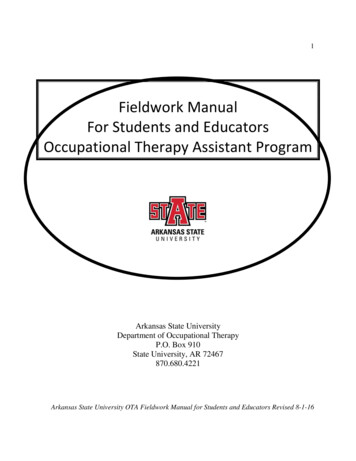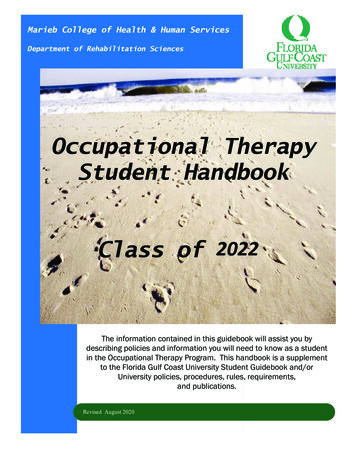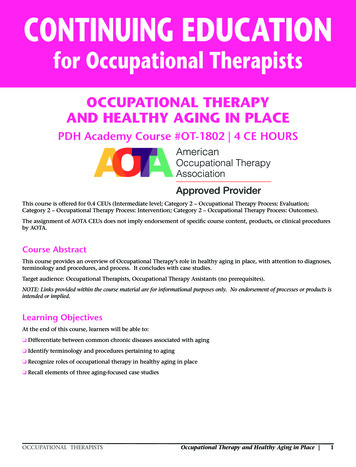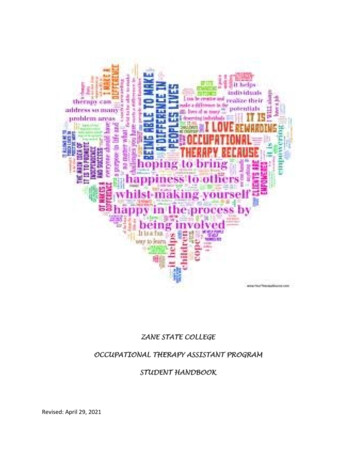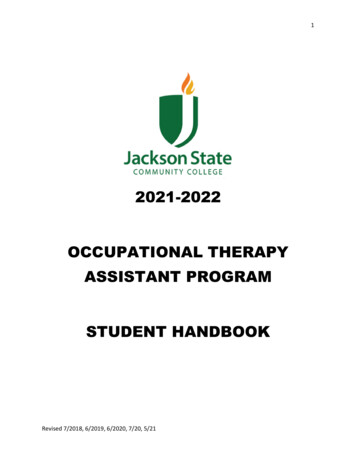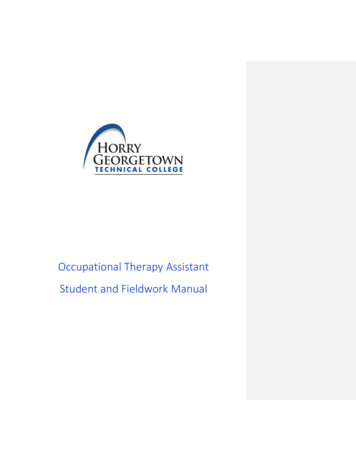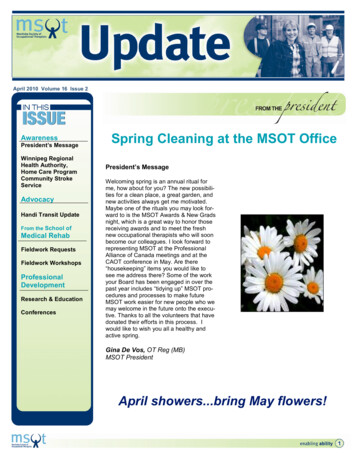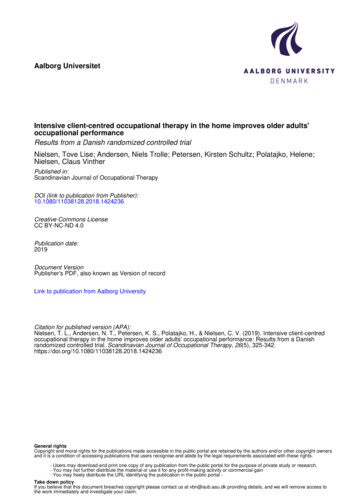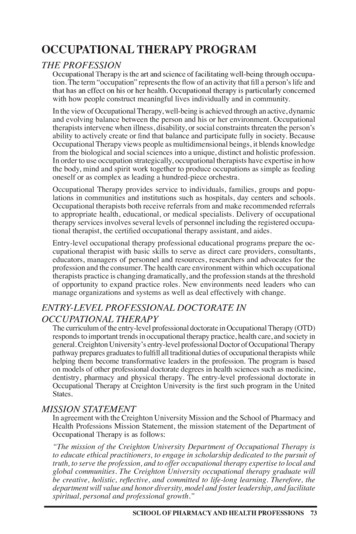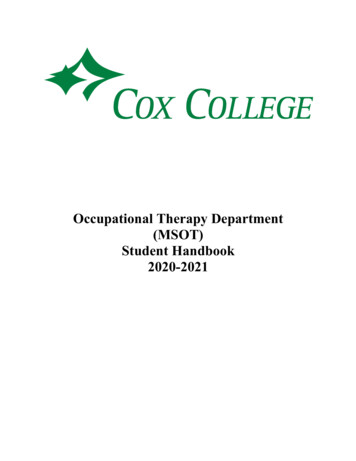
Transcription
Occupational Therapy Department(MSOT)Student Handbook2020-2021
COX COLLEGEGeneral InformationThe policies and procedures contained in this handbook are subject to change without notice at thediscretion of the Program Chair with the approval of the Vice President of Academic Affairs. Anychanges made will be communicated to students in a timely manner. This Handbook is not intended to bea contract, explicit or implied. It is the responsibility of each student to be acquainted with allrequirements, policies, and procedures for his or her degree program and to assume responsibility formeeting those requirements.It is the student’s responsibility to become familiar with these documents and abide by all policies whileenrolled at Cox College. Cox College policies can be found in the Student Portal. Tuition and fees can befound in the Cox College Catalog and are subject to be changed at the discretion of the College.Please contact the Program Chair, Academic Advisor, or Vice President of Academic Affairs withquestions regarding the information in this Handbook or general Cox College policies andprocedures.Mission, Core Values, and GoalsMission StatementCox College is committed to excellence by meeting the educational needs of students and the health carecommunity.Core ValuesStudent First: We believe in providing a learning environment that promotes student inspiration, supportand academic achievement.Highest Quality: We believe in providing an educational experience utilizing cutting edge technologyand evidence-based curriculum.Communication: We believe in shared, transparent communication that is respectful and responsible.Nothing is Impossible: We believe in working together, taking reasonable risks and daring to change sothat the impossible becomes possible.Lifelong Learning: We believe that professional curiosity develops over a lifetime based on selfevaluation, effective questioning and critical analysis of information.Cox College GoalsTo provide quality educational programs.To provide a quality customer experience.To provide a quality workforce experience.To achieve quality business practices.To collect data and utilize systematic assessment practices.2
Accreditations and OrganizationsCox College is accredited by The Higher Learning Commission, 230 N. LaSalle Street, Suite 2400,Chicago, IL 60602-2504, 800-621-7440. https://www.hlcommission.org/.Cox College is a single-purpose specialized private college and a partner of CoxHealth. The collegeprovides integrated, comprehensive educational programs to prepare graduates for a changing health careenvironment.MSOT AccreditationThe Cox College entry-level occupational therapy master’s degree program is accredited by theAccreditation Council for Occupational Therapy Education ( n.aspx ) of the American Occupational Therapy Association (www.aota.org), locatedat 4720 Montgomery Lane, Suite 200, Bethesda, MD 20814-3449. ACOTE’s telephone number c/oAOTA is (301) 652-AOTA and its Web address is www.acoteonline.org. Graduates of the program willbe eligible to sit for the national certification examination for the occupational therapist administered bythe National Board for Certification in Occupational Therapy (NBCOT). After successful completion ofthis exam, the individual will be an Occupational Therapist, Registered (OTR). In addition, all statesrequire licensure in order to practice; however, state licenses are usually based on the results of theNBCOT Certification Examination. Note that a felony conviction may affect a graduate’s ability to sitfor the NBCOT certification examination or attain state licensure.Accreditation of the occupational therapy program permits Cox College MSOT graduates to apply for thenational certification examination administered by the National Board of Certification in OccupationalTherapy (NBCOT). A passing score on the certification exam is required to practice in all 50 states.Additionally, graduates must submit their NBCOT scores for licensure in the respective state(s) wherethey intend to practice.** Note: Students must complete Level II Fieldwork Experiences within 24 months following thecompletion of the didactic portion of the program.Non-Discrimination Policy StatementCox College is committed to maintaining a community that values the worth and dignity of every person,and fosters understanding and mutual respect among its members. Cox College does not discriminateagainst any member of the College community on the basis of race, color, national origin, religion,disability, age, veteran status, political affiliation, sex, sexual orientation, gender identity, pregnancy,marital status, or any other basis protected by law in its programs and activities.Inquiries concerning the non-discrimination policy or the procedure for filing a complaint should beaddressed to Betty Breshears, Vice President of Corporate Integrity (417) 269-8806, orcompliance@coxcollege.edu, or to the Office for Civil Rights.3
A Message to the MSOT StudentCongratulations on becoming an occupational therapy student at Cox College! We recognize the hardwork and dedication that you have invested in your career already. You have competed with hundreds ofother motivated students from across the United States in order to attain a position in this program. Youhave worked hard to get here and we look forward to seeing you succeed in this program.At Cox College, we take our mission of excellence in educating students and the healthcare communityvery seriously. You will find excellent faculty members who care deeply for students. I am proud towelcome you to a college where excellence is the standard and the faculty strive daily to exceed thatstandard.We value individual work ethic, skills development, and productivity. We value student initiative,especially related to exploration and discovery of occupational therapy evidence-based practice. We striveto tailor every assignment as a tool that shapes your professional development, confidence, andcompetency. We do not believe in busy work. The work that you will do in this program will result incritical thinking skills and clinical skills that will change lives and we value your future career so muchthat we have set incredibly high standards in order to support your professional development. Thesestandards are designed for the purpose of setting each of you up for career and personal success.This student handbook, along with the college catalog, will help acquaint you with the policies andprocesses here at Cox College. If you need any additional information, please consult with a facultymember, your faculty advisor, or myself. We are happy to assist you as you progress through the programtoward your chosen career.We look forward to watching you learn and grow. We are cheering for your success!Amy Vaughan, OTD, OTR/L, BCPDoctor of Occupational Therapy, Board Certified in PediatricsMaster of Science in Occupational Therapy Department Chair & Associate ProfessorPresident, Missouri Occupational Therapy Association4
Table of Contents247General InformationA Message to the MSOT StudentSection 1: MSOT Mission, Vision, & Philosophy of EducationMSOT Program OverviewMSOT Vision, Mission, PhilosophyMSOT Curriculum Threads and Outcomes11Section2: Professional Conduct StatementsMSOT Expected BehaviorsLearning Participation ExpectationsClinical Behavior ExpectationsCox College Online IntegrityProfessional Code of EthicsMSOT Character ExpectationsChain of Command15Section 3: MSOT Academic InformationAdmissions RequirementsMSOT CurriculumGrading ScaleGrade ReportingSkills CompetenciesMake-Up PolicyRepeating CoursesProgressionMSOT Policy on Disrupted ProgressionDegree Requirements & Application for GraduationGraduation RequirementsWithdrawal from Cox College or the SemesterWithdrawing (“dropping”) from a CourseLeave of Absence (LOA) from the MSOT ProgramServices and AccommodationsIncomplete GradeCox College Virtual Access PolicyCox College COVID-19 StatementMSOT Advisement PolicyOriginal Work SubmissionsAPA ExpectationsCanvasEquipment and SuppliesCommunication Related to Policy/ Program ChangesFieldworkInclement WeatherLetter of Reference22Section 4: ProfessionalismMSOT Policy on AttendanceDress CodeGeneral Hygiene5
Participation & EngagementCell Phone /Technology UseProfessional MembershipsProfessional Electronic Communication24Section 5: Disciplinary ActionStudent Performance Improvement Plan ProcessStudent Discipline & Academic Integrity25Section 6: MSOT Department Compliance & SafetyBackground Check and Drug ScreeningDrug-Free SchoolsStudent Rights in Delivery of CareHealth Risk for Students Delivering Client CareStudent Health PolicyFamily Educational Rights and Privacy Act (FERPA) Directory InformationNotification of Rights Regarding Education RecordsStudent Exposure to Blood, Potentially Infectious Body Fluids, and Illness29Section 7: Professional Resources & LicensureCertification / Licensure RequirementsMissouri OT License30Important Contact Information6
Section 1: MSOT Mission, Vision, & Philosophy of EducationMSOT Program OverviewAt Cox College, students experience hands-on learning opportunities in classroom, clinical, andcommunity settings. The MSOT program combines a strong evidence-based learning environment withapplication in the community.Occupational therapy focuses on helping a person engage in everyday activities that they want and needto do (WFOT, 2012). Driving, cooking, dressing, bathing, and playing are common everydayoccupations. Occupational therapists are skilled in helping a person return to meaningful activities oradapt and modify activities in order to support the highest quality of life when development or injury hasnegatively impacted daily life. Students who enter the field of occupational therapy often have excellentinterpersonal skills and strong interests or backgrounds in psychology/ social sciences, athleticperformance/ movement, anatomy, and neurosciences. In short, occupational therapists use occupation asan avenue to promote health and well-being (WFOT, 2012).VisionDepartment of Occupational Therapy at Cox College: Leaders in occupational therapy education.MissionThe mission of the Department of Occupational Therapy at Cox College is to create scientist-practitionerswho are client-centered, occupation-driven, and clinically competent. We achieve this mission by:1. Utilizing a multi-modal approach to curriculum delivery resulting in therapists equipped tosucceed in diverse health care environments. (KNOWING)2. Encouraging reflective practice to advance critical thinking, clinical reasoning, and problemsolving skills. (DOING)3. Providing opportunities for commitment to the everyday advancement of the field ofoccupational therapy. (ADVANCING)4. Collaborating with community partners to advance the practice of occupational therapy inSouthwest Missouri. (LEADING)PhilosophyThe curriculum is designed to be multi-modal with the understanding that transformative learning occursthrough multiple forms of content delivery and repeated exposure to content. The Department ofOccupational Therapy shares the philosophy of the profession in that “people of all ages and abilitiesrequire occupation to grow and thrive” (Hooper & Wood, 2014). In keeping with the Cox Collegemission of commitment to teaching clinical excellence, the Occupational Therapy Program viewsoccupation, occupational performance, and occupational participation as fundamental principles fororganizing the curriculum, including service learning projects and active teaching/learning processes(learning through doing). Embedded within the curricular design is the singular principle that anindividual’s occupational performance can be positively shaped by focus on the “whole person” andattending to his/her physical, psychological, spiritual, social and cultural concerns as influenced by bothinternal environment (within a person) and the external environment (outside a person). Using theseguiding concepts, students are encouraged to develop the capacity to examine and analyze theoccupations people perform as well as enable the students to use occupation as the medium to assistpeople and communities to “live life to the fullest.”7
Curriculum Threads & OutcomesIn the MSOT curriculum, there are common themes and threads that contribute to the overall learningexperience for the student. The curriculum is designed to produce practitioners that fulfill the mission andvision of the MSOT Department. Cox College MSOT curriculum provides opportunities for:1. Utilizing knowledge of how the human body operates and achieves participation in meaningfuleveryday activities in order to understand the unique needs of individual clients. (KNOWING)2. Developing clinical competency and professionalism in order to deliver skilled occupationaltherapy services in a variety of contexts and environments. (DOING)3. Advancing the profession through evidence-based practice and evidence contribution.(ADVANCING)4. Participating in professional development, committing to professional membership, andcollaborating with community partners. (LEADING)The Cox College curriculum transforms information from the natural and basic sciences and liberalarts into an applied, holistic understanding of the art and science of occupational therapy in the learner.The curriculum reflects the person-occupation-environment interaction, the domains-processes ofoccupational therapy, and life span occupational performance as the central organizing concepts of thecurriculum. The Person-Environment-Occupation-Performance (PEOP) model and the OccupationalTherapy Practice Framework (OTPF) are the two occupational therapy theory foundations that are thebackbone of the entire curriculum. They reflect the profession’s core beliefs in the relationship betweenoccupation and health and its view of people as occupational beings.Each course intentionally considers and applies the PEOP – OTPF model with all course content andobjectives as a major unifying curriculum thread that supports the achievement of the curricularoutcomes. Courses are logically sequenced to instill in students a comprehensive knowledge andapplication of this relationship and its application to occupational therapy practice.In addition, the Scientist-Practitioner Model is applied to the MSOT curriculum delivery. TheScientist-Practitioner Model is endorsed as a favored model for the development of professionals inbehavioral health and service-delivery fields (Hoidin & Olbert-Bock, 2016). It addresses the concernthat educational programs might produce “people who can talk about practice rather than people whoare competent practitioners” (Borders & Bloss, 1994). This model is designed to encourage studentsto integrate research and practice and utilize “clinical inquiry” (Hoshmand, 1991) in their clinicalwork. An underlying philosophy of teaching in this manner is that an effective curriculum createsprofessional ‘habits’ and requires intentional placement of opportunities for students to engage inclinical inquiry.Students first acquire knowledge regarding how the body operates (OTPF: client factors - neuromotor &sensory, biomechanical, cognitive and psychosocial function). Coursework includes but is not limited toanatomy, physiology, kinesiology and medical conditions. Transformation of information goes towardsunderstanding subsystem functions and interventions that contribute to the participation and performanceof occupations (OTPF: areas of occupation, performance skills and performance patterns). Students thencombine all of this information in understanding the person as an occupational being whose underlyingabilities in combination with environmental constraints and supports, determine occupationalperformance (OTPF: context and environment plus activity demands).The curriculum utilizes metacognitive learning theory to interweave the two major threads - the PEOPalong with the Occupational Therapy Practice Framework (OTPF) in that it places/offers: A graded developmental approach to acquiring the knowledge, skills and attitudes to be aclinically competent entry-level practitioner who reflects on and engages in the scholarlyapplication of occupational therapy and has a skill set to deliver person-centered, evidence-based8
occupational therapy.An emphasis on occupation as the link between person and environment and as an organizingframework for understanding the interaction of these factors on occupational performance.A central focus on occupation, on humans as occupational beings, and on the complex processesby which people find meaning and health through the interactive person-environment process of‘doing’ or engaging in occupations.A comprehensive understanding of both personal factors and context or environmental influenceson occupational performance and function in the areas of occupation.An intentional use of metacognition strategies that foster learning in context. As a result, studentsknow themselves as learners and develop the ability to approach tasks successfully because theyunderstand that they learn different kinds of tasks differently. This sets them up for successfulproblem solving skill development in clinical practice.An intentional use and application of the PEOP – OTPF relationship with all course content andobjectives as the major unifying curricular thread in curriculum delivery.The entry-level MSOT curriculum model (figure 1) illustrates didactic-to-clinical experiences designedfor the Cox College occupational therapy student. The inner color-filled square shows how the PEOP& OTPF theories permeate the curriculum. The hexagons depict the curriculum sequences, with thestudent’s clinical competence as the central core representing the culmination of the integration of thecurriculum into application. The arrow of clinical inquiry represents the influence of the scientistpractitioner training where students are consistently questioning and advancing their practice throughlife-long learning.9
Health & Wellness *** Rehab Disability & Participation *** Mental ultural &Global IssuesKNOWINGBasic SciencesClinicalCompetenceClinical InquiryInnovations &Technology GEvidence BasedPractice inOccupationalTherapyDOINGOCCUPATIONAL THERAPY PRACTICEFRAMEWORKChild & Youth *** Productive Aging *** Work & IndustryFigure 1: MSOT Curriculum ModelCourses within each course sequence (depicted as hexagonals in figure 1) concurrently or progressivelyeither complement each other or provide increasingly more complex applicable information andexperiences than previous courses in and out of the sequences. The knowledge and skills learned areunified by the application of PEOP – OTPF theories. For example, student learning in Development ofHuman Occupations is tandem with Pathophysiology and Human Performance, enabling students tointuitively understand how factors associated with dysfunction influence occupational performance.The sequencing not only allows for ample skill and knowledge preparation, but also fosters high-levelstrategic learning particularly, metamemory (the intuitive knowledge of one’s memory capabilities andstrategies to improve it), metacomprehension (the ability to assess one’s own skills, knowledge, learning,or depth of understanding), problem solving, critical thinking, and clinical reasoning.In keeping with the Scientist-Practitioner Model, the MSOT curriculum seeks to provide students withample, repeated opportunities to create habits and skills related to clinical inquiry. Love, Carr, LeBlanc,and Kisamore (2013) have suggested evidence-based teaching strategies to develop scientist-practitionersthat can be adapted for use in the MSOT program. Specifically, they suggest use of the Behavioral SkillsTraining Model (Miltenburger, 2004) which includes instruction, modeling, rehearsal, and feedback toteach Master’s level students. This evidence-based, robust strategy for developing scientist-practitionersis utilized in the MSOT program at Cox College.10
The curriculum sequences provide activities to learn: The structure and function of the human body as it relates to occupations (KNOWING); Theoretical and philosophical foundations of occupational therapy practice(KNOWING); Expressions and use of occupations and technology for teaching and learning across thelifespan (KNOWING & DOING); Identification and treatment of developmental and acquired occupational dysfunctionsusing occupation based interventions (DOING); Evidence basis and scholarly explorations for accountable practice (DOING &ADVANCING); Repeated practice using clinical inquiry in order to create the habits of a scientistpractitioner (DOING & ADVANCING); Clinical competence in all areas of practice, and beginning specialization as a reflectiveentry-level professional (DOING & ADVANCING); Leadership and advocacy for responsible collaborative clinical practice (ADVANCING& LEADING).ReferencesBorders, D.L. & Bloss, K.K. (1994). Helping students apply the scientist-practitioner model: A teachingapproach. Counselor Education & Supervision, 34(2).Hoidin, S., & Olbert-Bock, S. (2016). Learning and teaching research methods in management education:Development of a curriculum to combine theory and practice—a Swiss case. InternationalJournal of Education Management, 30(1).Hooper, B., & Wood, W. (2014). The philosophy of occupational therapy: A framework for practice. InB.A. Boyt Schell, G. Gillen & M. Scaffa (Eds.), Willard and Spackman’s occupational therapy(12th ed., pp. 35-46). Philadelphia: Lippincott Williams & Wilkins.Hoshmand, L.L.T. (1991). Clinical inquiry as scientific training. The Counseling Psychologist, 19,431453.Love, J.R., Carr, J.E., LeBlanc, L.A., & Kisamore, A.N. (2013). Training behavioral research methods tostaff in an early and intensive behavioral intervention setting: A program descriptions andpreliminary evaluation. Education and Treatment of Children, 36(1), 139-160.Miltenberger, R.G. (2004). Behavior modification: Principles and procedures (3rd ed.). Belmont, CA:Wadsworth.United States Department of Labor (2017). Bureau of labor statistics. Retrieved from:https://www.bls.gov/.Section 2: Professional Conduct StatementsMSOT Expected BehaviorsAcademic performance is the beginning of skill development as a therapist; however, professionalbehavior is equally essential to the success of an occupational therapist. Professional behavior includesmaintaining high standards for class/ group project/ fieldwork attendance, a positive attitude and activeengagement in both classroom and clinical learning environments, high academic integrity, andthoughtful completion of assignments and meeting deadlines in a timely manner. The followinginformation includes specific information related to expected behaviors:Learning Participation Expectations:11
Graduate school is demanding of both the graduate student and the MSOT faculty. The MSOTfaculty are tasked with providing opportunities for students to gain skills in clinical competencyand excellence in delivery of occupational therapy services as entry-level practitioners. TheMSOT program is intensive. Students are expected to plan for significant time, inside and outsideof class, which includes group work/ project work, and skills practice rehearsal in the skills lab.Students are expected to complete readings and assignments prior to class attendance so that classtime can be used to enhance student understanding related to subject material or expand the scopeof the material covered. Class time will often be used to apply concepts and not to reviewassigned preparation material. Therefore, it is essential that students plan for preparedness andparticipate as active, engaged learners with the information.Students are expected to ask questions, actively contribute to classroom and online discussions,seek help and clarification, supplement assigned readings with further exploration of a conceptwhen needed, and proactively make instructors and academic advisors aware when academic orclassroom issues arise from a student perspective. Group work is the responsibility of all groupmembers; conflict within a group suggests the need for a meeting with the class advisor forsupport and mediation.Unprofessional behavior, poor academic performance, or poor academic engagement andparticipation can result in a Student Performance Improvement Plan process that may lead todismissal from the MSOT program. Please see the Student Performance Improvement PlanProcess for more information.Students seeking formal accommodations under Section 504 should contact the AcademicResource Center. Faculty are not permitted to make 504 accommodations directly with students,but rather through involvement with the Academic Resource Center. Forms for accommodationsare available in the Cox College Student Portal.Clinical Behavioral Expectations:The MSOT Program has a number of hands-on learning opportunities including fieldtrips, servicelearning experiences, skills lab experiences, Level I Fieldwork Experiences, and Level IIFieldwork Experiences that collectively shape clinical judgement and skill development. Thisgroup of experiences prepares students to launch professional careers as occupational therapists.Clinical experiences are designed to familiarize students with a variety of occupational therapyservices, populations, and practice contexts. This includes settings such as acute care andrehabilitation, pediatric, older adults, community and mental health settings. Clinical experiencesintroduce the roles and responsibilities of occupational therapists and other key practitioners ineach setting. Students develop soft skills such as clinical observation skills, interviewing skills,communication skills, and professional behavior interaction skills throughout these experiences.Students have the opportunity to practice developing therapeutic rapport and maintainingtherapeutic use of self throughout these experiences. These experiences also give students theopportunity to deploy professional clinical skills and knowledge. Prior to each clinicalexperience, students are provided with a set of objectives that target the expected clinicalbehaviors, professionalism, and performance for that experience.Students are expected to apply the concepts from their courses while engaging in clinicalexperiences. Professional attitude, tone of voice, demeanor, presentation, and timeliness areessential professional skills. Students are expected to engage in professional reflection and selfassessment in order to improve performance. These skills reflect the student’s growingprofessional reputation as well as the Cox College MSOT Program reputation.12
Students are expected to demonstrate values, attitudes, and behaviors congruent with theoccupational therapy profession’s philosophy, core values, standards, and ethics. Students shoulddemonstrate intellectual growth and critical thinking through maintaining a professionalappearance and demonstrating the ability to ask appropriate questions at appropriate times, togather information and report objective findings using appropriate terminology, to behave in asafe, appropriate manner, and to respect the rights and confidentiality of clients. Students areexpected to show respect towards all populations, cultures, people, and property. Students areexpected to recognize personal bias and move toward client centered practice during clinicalexperience. Students should be focused and productive during clinical experiences, which doesnot leave time for texting, checking phones, taking non-sanctioned pictures, engaging inextensive social conversation, or using the clinical computers for accessing non-clinicalinformation. Respecting rights and confidentiality of patients, including not taking pictures are alegal requirement under HIPAA, not just an expectation.Unprofessional behavior, poor clinical performance, or poor clinical engagement andparticipation can result in a Student Performance Improvement Plan process that may lead todismissal from the MSOT program. Please see the Student Performance Improvement Planprocess for more information. Gross negligence or intentionally malicious behavior are groundsfor immediate dismissal from the Cox College MSOT Program.Cox College Online IntegrityEnsuring the integrity of distance education courses at Cox College is done via the student portal.Students access the online learning platform via a student portal, which requires one password andtakes them to another secure log-on for the Canvas Learning Management System (LMS) itself.Students have access to courses three days prior to the term and then fourteen (14) days after theend of the term. When a student drops or withdraws from a course, the student loses access to thepermissions to view the online course within twenty-four (24) hours.Log-on instructions to the student portal are provided by Admissions at the point ofapplication. Access to the Canvas LMS is opened three days prior to the course start date. Thestudent portal has training modules available to students related to the use of technology at CoxCollege and the Canvas LMS. Respondus Monitoring and Lockdown Browser modes are utilizedto ensure online integrity during online testing.Professional Code of EthicsStudents are expected to read and apply the Occupational Therapy Code of Ethics (AOTA, 2015)including all principles and standards of conduct related to professional behavior (e.g. Beneficence,Nonmaleficence, Autonomy, Justice, Veracity, and Fidelity).Reference:American Occupational Therapy Association. (2015). Occupational therapy code of ethics. In AOTA: Thereference manual of the official documents of the American Occupational Therapy Association,Inc. (20th ed.). Bethesda, MD: Author.MSOT students are involved in cl
Occupational therapy focuses on helping a person engage in everyday activities that they want and need to do (WFOT, 2012). Driving, cooking, dressing, bathing, and playing are common everyday . the domains-processes of occupational therapy, and life span occupational performance as the central organizing concepts of the curriculum. The Person .
